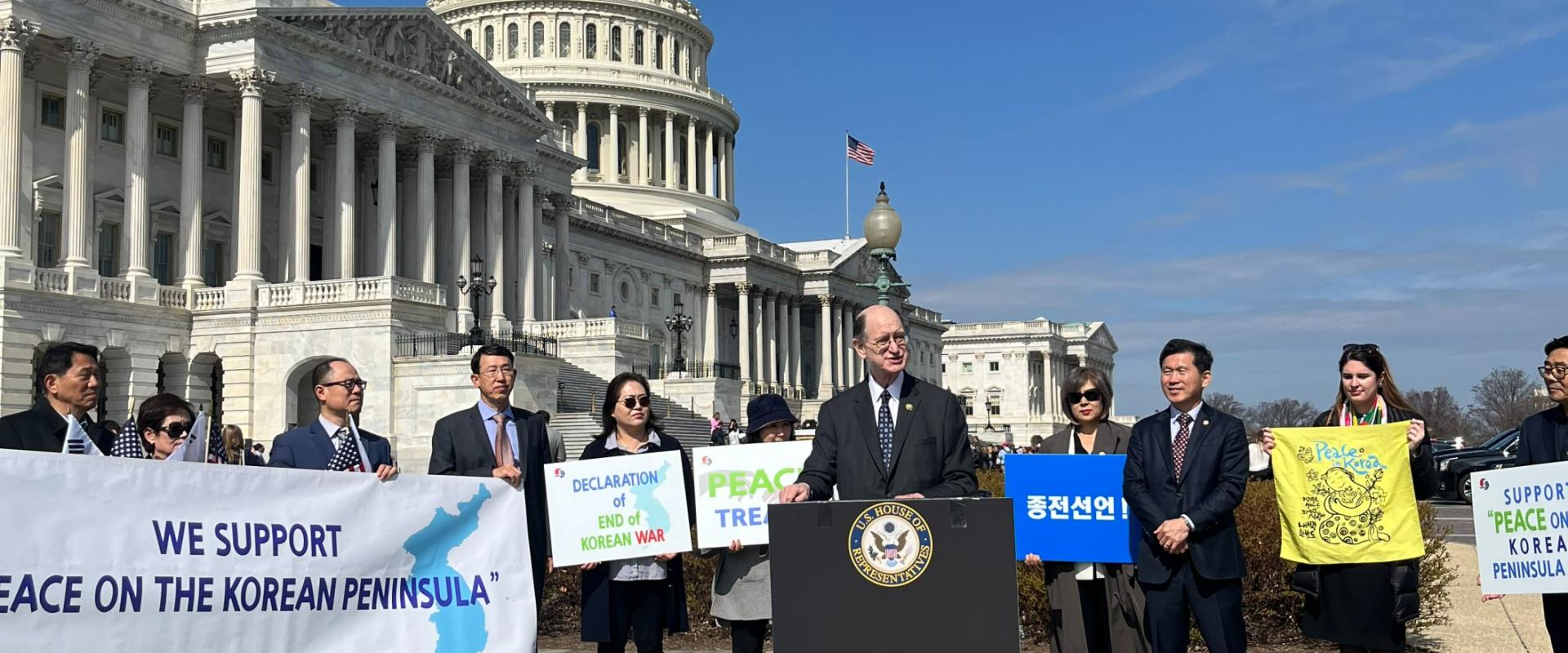Congressman Brad Sherman Leads Colleagues in Re-Introducing the Peace on the Korean Peninsula Act

Washington, D.C. – Today, Congressman Brad Sherman (CA-32), senior member of the House Foreign Affairs Committee, led 19 members of Congress in re-introducing the Peace on the Korean Peninsula Act – bipartisan legislation that calls for serious, urgent diplomatic engagement in pursuit of a formal end to the Korean War. Congressman Sherman made the announcement in a press conference on Capitol Hill and was joined by his Congressional colleagues along with members of the Korean American Public Action Committee (KAPAC) and supporters of the Korea Peace movement.
"The continued state of war on the Korean Peninsula does not serve the interests of the United States nor our constituents with relatives in North and South Korea," said Congressman Brad Sherman. "Serious, urgent diplomatic engagement is needed to achieve peace between North and South Korea. I'm pleased to stand here today, with my colleagues, the Korean American community, and supporters of the Korea peace movement, to reintroduce this crucial bill and continue to help grow the movement for Korea peace."
In 1953, the parties to the Korean War signed an Armistice Agreement that pledged an end to "all acts of armed force in Korea until a final peaceful settlement is achieved." Common sense tells us that this conflict ended in July 1953. But in fact, we only signed an armistice. Therefore, we have officially remained in a state of war with North Korea for 70 years. This situation does not serve anyone's interest.
On April 27, 2018, in Panmunjom, the leaders of South Korea and North Korea declared that "a new era of peace has begun on the Korean peninsula," and committed "to declare the end of war" on the Korean peninsula 65 years after the signing of the armistice agreement.
The Peace on the Korean Peninsula Act expresses support for the commitments made at Panmunjom and urges the Secretary of State to pursue meaningful diplomatic engagement with North Korea and South Korea in pursuit of a binding peace agreement constituting a formal and final end to the state of war between North Korea, South Korea, and the United States. The bill also requires a report from the Secretary of State that describes a clear roadmap for achieving a permanent peace agreement on the Korean peninsula.
One major consequence of the continuation of the Korean War is that the United States does not have formal relations with North Korea. The current restrictions barring United States nationals from traveling to North Korea have had profound effects on Americans with relatives living in North Korea, who long to see their relatives – in many cases, for one last time.
The Peace on the Korean Peninsula Act requires the Secretary of State to conduct a full review of the restrictions in place conditioning the travel of Americans to North Korea, and to submit a report to Congress detailing that review.
Congressman Sherman is pleased to be joined by his bipartisan colleagues Representatives Ro Khanna (D-CA), Andy Kim (D-NJ), Cori Bush (D-MO), Luis Correa (D-CA), Eleanor Holmes Norton (D-DC), Paul Tonko (D-NY), Chuy Garcia(D-IL), Andy Biggs (R-AZ), Dina Titus (D-NV), Rashida Tlaib (D-MI), Marilyn Strickland (D-WA), Sara Jacobs (D-CA), Jan Schakowsky (D-IL), James McGovern (D-MA), Lisa Blunt Rochester (D-DE), Adriano Espaillat (D-NY), Pramila Jayapal (D-WA), Judy Chu (D-CA), and Ilhan Omar (D-MN) in introducing the Peace on the Korean Peninsula Act.
To see the text of the bill, click here.
To watch Congressman Sherman's press conference from today, click here.
###